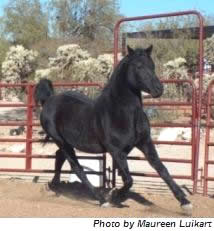 This edition of the Epona News is dedicated to Midnight Merlin, who passed away on February 9. We received over 300 cards and emails from people around the world after the initial brief announcement, many with stories about formal and impromptu lessons the stallion had taught over the years, some “in person,” some through Linda Kohanov’s books, and some through powerful dreams and journeys. Linda herself shares some potent synchronicities that Merlin inspired in the wake of his sudden departure in her tribute at the end of this newsletter. He will also be a prominent figure in her upcoming book on leadership.
This edition of the Epona News is dedicated to Midnight Merlin, who passed away on February 9. We received over 300 cards and emails from people around the world after the initial brief announcement, many with stories about formal and impromptu lessons the stallion had taught over the years, some “in person,” some through Linda Kohanov’s books, and some through powerful dreams and journeys. Linda herself shares some potent synchronicities that Merlin inspired in the wake of his sudden departure in her tribute at the end of this newsletter. He will also be a prominent figure in her upcoming book on leadership.
A number of people asked how they could contribute in Merlin’s memory. This simple question led to the establishment of a memorial fund. The following press release was sent out nationally announcing the fund and why Merlin inspired this new program for returning veterans and their families. Please pass the word!
Merlin Inspires Memorial Fund for Veterans
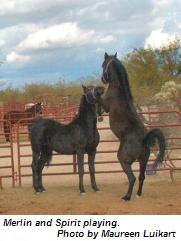 When veterans return home from extended tours of duty, it’s cause for celebration. But unexpected feelings of isolation, anger, grief, and shame all too easily lead to substance abuse, depression, divorce, excessive risk taking, and even suicide. Spouses, parents, and children simply aren’t equipped to deal with the “invisible wounds of war,” and natural reactions to a warrior’s emotional pain are often counterproductive. The resulting confusion can all too easily escalate into cycles of abusive outbursts, overwhelming guilt and silent alienation.
When veterans return home from extended tours of duty, it’s cause for celebration. But unexpected feelings of isolation, anger, grief, and shame all too easily lead to substance abuse, depression, divorce, excessive risk taking, and even suicide. Spouses, parents, and children simply aren’t equipped to deal with the “invisible wounds of war,” and natural reactions to a warrior’s emotional pain are often counterproductive. The resulting confusion can all too easily escalate into cycles of abusive outbursts, overwhelming guilt and silent alienation.
“There’s a serious lack of educational programs that assist military personnel and their families in making the smoothest possible transition from the battlefield to life back home,” says Linda Kohanov, founder/director of the Epona International Study Center, which teaches emotional fitness, relationship, nonverbal communication and leadership skills, in part through working with horses. “Many of these servicemen and women have the endurance, intelligence, and discipline to become tremendous assets to this country, but their lack of training in emotional fitness and social intelligence skills becomes a significant hindrance to long term success. Children also suffer from the resulting instability in family life, making the psychological wounds of war a multi-generational phenomenon.”
Recognizing that funding sources tend to favor people with severe clinical depression and post traumatic stress disorder (PTSD), Linda and her colleagues have created the Merlin’s Spirit Memorial Fund for returning military personnel, veterans and their families. Named for Linda’s stallion Midnight Merlin and his son Spirit, the program teaches people advanced personal and professional relationship skills, empowerment, and resilience in the face of traumatic events.
When Linda met Merlin in 1999, he was a stunning black stallion with tremendous untapped potential, but early training made him so dangerous and unpredictable that he had to be kept in an isolated corral. “Some techniques used in training show horses are the same techniques that were traditionally used for war horses,” she reveals. “In the wrong hands, these practices become abusive, creating volatile, rage-filled horses. In rehabilitating Merlin, I realized that he had many of the symptoms that veterans with PTSD report, a frightening combination of power, energy and hyper-vigilance leading to explosive outbursts of anger followed by an almost unbearable combination of vulnerability, confusion and shame for his actions. He threatened my life several times, but something in his eyes kept me from giving up on him.”
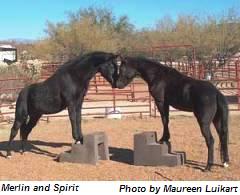 In teaching the frustrated stallion how to respectfully integrate into a herd, Linda tapped what she calls a “fierce sensitivity” in herself and her mares. She learned to set strong yet compassionate boundaries with Merlin while helping him break the cycle of rage and shame that kept him isolated from humans as well as other horses. And she began teaching these same skills to people through activities with gentler, specially trained horses, chronicling her experiences in three best-selling books.
In teaching the frustrated stallion how to respectfully integrate into a herd, Linda tapped what she calls a “fierce sensitivity” in herself and her mares. She learned to set strong yet compassionate boundaries with Merlin while helping him break the cycle of rage and shame that kept him isolated from humans as well as other horses. And she began teaching these same skills to people through activities with gentler, specially trained horses, chronicling her experiences in three best-selling books.
“Merlin had the most profound affect on veterans, who very much related to his story,” Linda reports. “They observed that it was a more difficult, arguably heroic act for Merlin to learn a new way of relating to the world than it was for him to keep reacting out of fear and anger. Seeing this powerful stallion living peacefully with his mares and working with his son Spirit, who sired his own daughter in 2008, would bring tears to their eyes, filling them with tremendous respect for their own challenges in returning to life back home. The fierce sensitivity I engaged with Merlin turned out to be an essential ingredient for family members to adopt in order to help their loved ones transform the intense emotional pain that many military service men and women feel in the wake of the all too common traumas of combat.”
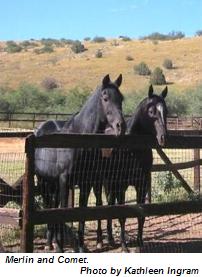 When Merlin died in February of 2009, the outpouring of cards and emails from around the world was startling. “People were asking for ideas on how they could contribute in his memory,” Linda says. “It occurred to me that the best tribute to the lessons Merlin taught us would be to create a fund to assist military service men, women, and their families in finding the same sense of peace and power that he eventually achieved.”
When Merlin died in February of 2009, the outpouring of cards and emails from around the world was startling. “People were asking for ideas on how they could contribute in his memory,” Linda says. “It occurred to me that the best tribute to the lessons Merlin taught us would be to create a fund to assist military service men, women, and their families in finding the same sense of peace and power that he eventually achieved.”
Donations to Merlin’s Spirit Memorial Fund, a division of the Headlands Foundation, support workshops that teach military personnel and their families how to deal constructively with the challenges of re-integrating into society. “It’s simply impossible for soldiers who’ve faced the intensity of combat to go back to the way they were before they left,” Linda stresses. “These people are warriors. They’ve been initiated through extreme experiences, and it’s important for us to not only realize this, but to support the reentry process more effectively. At the same time, veterans need to learn new skills for channeling their tremendous power and energy into peacetime pursuits. For the vast majority of service men and women, this is less of a therapy issue and more of an educational issue. The stigma often associated with therapy in the military should not prevent people from getting the social intelligence and emotional strength training they need to excel. They made tremendous sacrifices for our safety. It’s in everyone’s best interest to help them find happiness and success in life.
“Spirit and his brothers ultimately benefitted from their father’s journey to greater health and balance. With the cycle of isolation, rage, shame and abuse broken, Merlin’s sons—and his little granddaughter—are among the calmest, bravest, yet most spirited and personable horses you’ll ever meet. They now teach people from around the world how to move through their own challenges to better serve society and nourish future generations.”
To make online donations to Merlin’s Spirit Memorial Fund, visit http://www.headlandsfoundation.org/merlin.htm. Checks—made out to Headlands Foundation with Merlin’s Fund designated on the note line—may be mailed to The Epona Center, HC 1 Box 922, Sonoita, AZ 85637. Be sure to include your mailing address so that we can send you a receipt. (Donations are tax deductible as allowed by law.) For more information on how to contribute to or benefit from the program, contact the Epona Center at 520-455-5908 or booking@theeponacenter.com.
A Veteran’s Perspective
“Throughout history we have trained horses for success in combat,” says Terry Murray, Navy veteran and apprentice at the Epona Center. “Today, there’s a poetic irony in the way horses are teaching veterans how to succeed in civilian life.”
The issues involved are complex. Military socialization, beginning with boot camp, breaks down self-esteem and replaces it with unit-esteem in order to create a cohesive fighting unit. “Leaving their comrades in arms on the battlefield often creates feelings of betrayal, guilt and a powerful sense of loss,” Terry observes. “Your sense of identity, of being a soldier and an integral part of a unit, is fractured when you return home.”
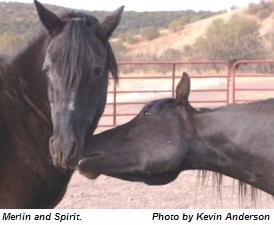 Moving from warrior culture to a thriving mentality is fraught with emotional difficulties. “Soldiers are trained incessantly to survive, creating a kind of muscle memory under the severe stress of combat,” he says. “They do not have time to process or grieve the violent injuries and deaths of their closest friends. A numbing of emotion occurs to serve the survival of the unit.” This numbing effect, coupled with an interrupted sense of self-esteem and episodes of survivor’s guilt, quickly become problematic in civilian life.
Moving from warrior culture to a thriving mentality is fraught with emotional difficulties. “Soldiers are trained incessantly to survive, creating a kind of muscle memory under the severe stress of combat,” he says. “They do not have time to process or grieve the violent injuries and deaths of their closest friends. A numbing of emotion occurs to serve the survival of the unit.” This numbing effect, coupled with an interrupted sense of self-esteem and episodes of survivor’s guilt, quickly become problematic in civilian life.
“It’s very helpful for returning military personnel to learn some emotional intelligence skills to process and manage the experiences of their transition,” Terry emphasizes. Aside from the obvious benefits in healing trauma and building strong personal relationships, emotional intelligence (EQ) has also statistically been shown to be four times more important in determining success in business than raw IQ and training. From manufacturing to sales to science, people with high EQ show greater productivity and personal advancement, generating significant revenue increases for their companies with less turnover and accidents. The military has begun to recognize the importance of these so-called “soft skills.” When the U.S. Air Force selected recruiters with high EQ, they experienced in a threefold increase in the number of recruits while generating a savings of $3 million annually.
Terry, who was stationed on an aircraft carrier during his military career, is now a successful business consultant and coach. Attending advanced leadership training at the Epona Center in 2008, he was impressed with how the specially designed equine activities enhanced EQ. As a result, he joined the 2009 Epona Apprenticeship Program to learn how to employ horses in training executives, management teams and veterans.
“Working with the horses creates an immediate shift in perspective by elevating self-awareness and self-esteem in a safe, confidential, and non-judgmental way,” he says. “Within this space, my sense of authentic self emerged, displacing the conditioned self I’d come to embrace. I’ve experienced powerful life metaphors in ten minutes with the horses that took me ten years to learn as a corporate leader, and I’ve mastered new EQ skills in record time. As a veteran who has successfully navigated the journey home, I greatly appreciate how this can accelerate the transition back to civilian life while maintaining the positive skills service members acquire while serving our country.”
Terry applauds the Merlin’s Spirit program for including family members in re-entry training. “During deployment, the family dynamics shift,” he observes, “with the spouse taking on new areas of responsibility and authority vacated by the soldier overseas. Upon return, there can be apprehension over redefined roles and power dynamics. Horses teach us the value of healthy boundaries. Soldiers are not allowed boundaries in the military. They live and die under authoritative rule; unit identity doesn’t allow for individual space. By practicing how to gently yet effectively set boundaries with a 1,000 pound horse—and learning how to translate this skill to human interactions—reuniting families begin to renegotiate their relationships from a place of understanding and respect.”
Finally, Terry notes, returning veterans face the challenge of entering a much more ambiguous culture. “In the military, everything is regimented and social status is plainly displayed on a person’s sleeve or collar,” he says. “The Epona program in particular teaches people how to be fully present and aware while collaborating continuously with change. The horses engage a new sense of balance-in-motion that empowers us to stay engaged even in highly ambiguous situations.”
Merlin’s Spirit Pilot Program
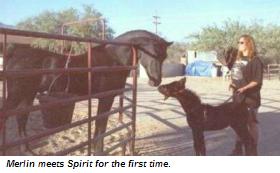 While the Merlin’s Spirit Memorial Fund is gathering force, Linda Kohanov will team up with psychiatrist/Epona Approved Instructor Nancy Coyne, M.D. to create a series of two-day pilot workshops for veterans and family members. The April 7-8 and May 18-19 seminars will include training, meals, and overnight accommodations at no cost to participants, who will be asked to fill out an in-depth evaluation.
While the Merlin’s Spirit Memorial Fund is gathering force, Linda Kohanov will team up with psychiatrist/Epona Approved Instructor Nancy Coyne, M.D. to create a series of two-day pilot workshops for veterans and family members. The April 7-8 and May 18-19 seminars will include training, meals, and overnight accommodations at no cost to participants, who will be asked to fill out an in-depth evaluation.
“In the past, we’ve successfully worked with veterans during regular workshops and private intensives,” Linda says. “However, the Merlin’s Spirit program will take this to a new level. We’re inviting veterans and returning military personnel to bring one family member with them, a spouse or other significant support person, to attend a two-day introductory experience. While people with clinical depression or more serious forms of PTSD will eventually be included in longer workshops and intensives, we ask that these initial two-day experiences be limited to those people with less severe re-integration needs.”
If you are, or know of, a veteran interested in attending the pilot program, please contact the center at rasa@theeponacenter.com or 520-455-5908.
Tribute to Merlin
I would like to thank everyone who sent their condolences for Merlin’s passing. Twenty-eight people came to his memorial service, and we received well over three hundred emails and cards! I was astonished, and deeply touched, by the impact Merlin had on so many people’s lives. There were some powerful synchronicities surrounding his death, a few of which I will share with you here.
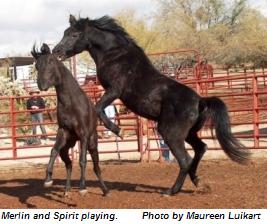 The end to Merlin’s earthly journey was sudden. He loved sparring with his son Spirit, which was fine when they were turned out together under supervision. Yet whenever Merlin got away from his handlers, he would immediately rush over to Spirit and try to play over the fence, an incredibly dangerous game. On February 9, he somehow escaped from his sturdy corral deep in the night. Without anyone around to stop these stallion shenanigans, the two were obviously taking significant risks. At some point, Merlin reared up, broke the fence and was impaled. We are reasonably sure he died instantly, as there wasn’t much blood that escaped from this extreme wound. Staff members Sue Smades and Shelley Rosenberg found Spirit, his mare Panther, and their daughter Artemis standing quietly beside Merlin’s body. They had not disturbed their patriarch in any way.
The end to Merlin’s earthly journey was sudden. He loved sparring with his son Spirit, which was fine when they were turned out together under supervision. Yet whenever Merlin got away from his handlers, he would immediately rush over to Spirit and try to play over the fence, an incredibly dangerous game. On February 9, he somehow escaped from his sturdy corral deep in the night. Without anyone around to stop these stallion shenanigans, the two were obviously taking significant risks. At some point, Merlin reared up, broke the fence and was impaled. We are reasonably sure he died instantly, as there wasn’t much blood that escaped from this extreme wound. Staff members Sue Smades and Shelley Rosenberg found Spirit, his mare Panther, and their daughter Artemis standing quietly beside Merlin’s body. They had not disturbed their patriarch in any way.
There was no sign of painful struggle. The wind was still that morning. The sound of water bubbling softly from nearby Apache Spring offered a gentle requiem. Merlin actually looked peaceful, as did the rest of the herd—uncannily so, as if they had all agreed ahead of time that this would be a good day, and way, to die.
Over the next few days, Merlin initiated the entire staff into some profound mysteries that will take time to process and translate into language. However, some words I had written the year I met him serendipitously came back to me the night before his memorial service. Titled simply “5-8-99,” this unpublished essay was composed during a plane ride on that date. I was returning from Ohio, where I’d been helping my mother Martha Kohanov face a serious cancer diagnosis. I knew she was preparing to leave this world.
These musings about life and death were written shortly before The Tao of Equus had been accepted by a publisher. In the subsequent frenzy of completing my first book, I had lost the essay, forgotten about it even, until Sarah Barron, one of our advanced instructors, found it stuffed between the pages of a book on Taoism during a workshop held the very week Merlin passed away.
My thoughts had a decidedly Taoist flavor on May 8, 1999 as I moved back and forth between the opposites of light and shadow, fortune and tragedy, day and night. Already I sensed that the abandoned stallion would be one of my greatest teachers in this respect. I would like to share two excerpts with you:
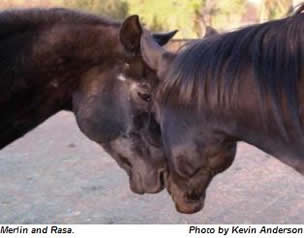 My sister and her daughter drop me off at the airport. We seemed to be running late, but the timing couldn’t have been better. No line at the American Airlines desk. Plenty of time to have a drink at the pub across from Gate A-1.
My sister and her daughter drop me off at the airport. We seemed to be running late, but the timing couldn’t have been better. No line at the American Airlines desk. Plenty of time to have a drink at the pub across from Gate A-1.
I sit down at the bar and order a dark and murky brew. The man sitting next to me is trading business cards with a stranger. “It’s called the Horseshoe,” he says, and though I catch this phrase completely out of context, I know his words can only bring good luck.
A week ago, we were in the abyss, my mother and I. Neither one of us was being very patient with the process. Sometimes the place between life and death seems more cruel than the end of this existence; the path back to health feels more treacherous than surrendering to the whims of illness. Is there wisdom behind all this suffering? And if so, how do we tap the bittersweet nectar at the center of each difficulty? I step on the plane and consider the possibilities.
I have learned from fear as much as I have reaped from security. I have seen the face of God in agony as well as ecstasy. I have gained immeasurable strength from recognizing my own weaknesses. These are the perfect flaws, the prisms through which the pure white light of the divine divides into the rainbows that hang above our earthly sphere, the crystallized tears that inspire us to give voice to what we feel, only because we’re afraid there may be no time left to say it.
The Grim Reaper, at his best, becomes the One-Eyed Jack, the wild card that helps us win the game, if only we have the skill to use it to our greatest advantage. Sometimes the threat of death tricks us into really living. Other times, the only way to beat the house is to lay our cards on the table and cash in that pile of chips before we loose them to the habits of ambition. I’m not quite sure how my mother will play this crucial hand. Death itself is a collaborator now, though it has taken me half a lifetime to let go of my fears and stare into this mystery.
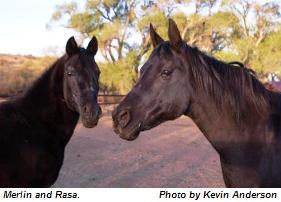 The essay is filled with references to a horse I had just started working with, a stallion named Midnight Merlin. A few days before I left my mother’s side, he showed up in a dream. It felt important at the time, but the imagery would not become fully decipherable until Merlin’s own death ten years later, though this synchronicity only adds to the mystery.
The essay is filled with references to a horse I had just started working with, a stallion named Midnight Merlin. A few days before I left my mother’s side, he showed up in a dream. It felt important at the time, but the imagery would not become fully decipherable until Merlin’s own death ten years later, though this synchronicity only adds to the mystery.
The doctors say my mother is dying of melanoma, the dark shadow that solidifies in the presence of too much sun, the black name that challenges every thought and every breath she takes. I may drop out of the sky at any moment. These are the dramas that angels watch on television, and they demand a happy ending. Still, good fortune to them has no earthly limit. The best stories are those peppered with tragedies overcome in this life, or the next, but it’s a rare mortal whose faith extends beyond that threshold.
I’m left holding onto the fragments of a dream. Meteors are shooting across the sky. The mask of a One-Eyed Jack is impaled on a stick next to a bubbling spring. My mother sits in a wheelchair, poised at the edge of all this madness as four rattlesnakes pass before her carrying off Merlin’s old shoes. When I first met the neglected night-haired stallion, he had outgrown his thick metal arches to such an extent that he limped around for hours after they were finally removed. Rearing in protest, he reminded us both of the power behind the pain.
Falling stars, perversely comical death masks, venomous snakes and lame black horses. We have the potential to draw more strength from these nocturnal images than our cultural idols would prefer us to consider. The shoe that no longer fits the horse becomes a charm when hung above the door. The poison that kills becomes the main ingredient in the tonic designed to heal. The old skin that begs to shed always feels like death, but new growth cannot assert itself as long as we hold onto our dry, scaly obligations.
I hear it’s raining at my mother’s house in Ohio. I search my purse for a cheap pair of sunglasses as the plane carries me toward the clear skies of the coming desert. Gazing across hundred acre farms that look like postage stamps, I catch a glimpse of a memory not my own that swirls and sparkles and turns inside out in the 10,000 joys and 10,000 sorrows of a setting sun:
My mother is a child being chased across an Alabama golf course by a trio of mischievous boys. They’re carrying a dead water moccasin, threatening to wrap it around her neck. After 60 years of running, she suddenly stops, turns to face her tormentors and the dreaded black serpent dissolves into a magnificent rainbow, arching above her in the sky like the door to another dimension.
My mother passed away on May 23, 1999. The small insurance policy she left allowed my sister to adopt a child in China. And though my husband and I were struggling, literally putting our mortgage on a credit card at the time, I used my portion of the inheritance for something whimsical, perhaps even foolish. I bought Midnight Merlin. When his former owner handed me his Arabian Registry papers, I couldn’t help notice that the stallion was born on May 23, 1986. My mother had died on his 13th birthday.
In life, Merlin was larger than life. His influence expanded exponentially as he exited this world with a massive blast of energy, leaving in his wake a surge of inspiration and insight. I miss him, most certainly, but I got the chance to say tearful goodbyes to him repeatedly over the years, as he was close to death a number of times, always making a miraculous recovery, the most impressive of which was chronicled in Riding between the Worlds. On February 9, 2009, he played a different hand, one that, as my strange, recently-recovered dream suggests, had been in the cards all along. He impaled himself on a stick next to a bubbling spring. He was 23 years old.
Louise Poppema, who joined us last fall for the Keeper of the Mysteries workshop, was among many people who offered profound words of comfort upon hearing the news: “It seems, perhaps, that as in life, Merlin made a proud and wild choice in the manner of his passing. No lingering frailty, no extended downward spiral. I hope that I, too, may be so fortunate as to die quickly while acting in a manner so true to my nature.”
I would like to offer special thanks and recognition to staff members Shelley Rosenberg, Sue Smades, Elizabeth Loper, and Rachael Wright who, with courage and sensitivity, laid Merlin to rest, creating a beautiful and serene gravesite here at Apache Springs Ranch where we can reflect on the many lessons he taught us.
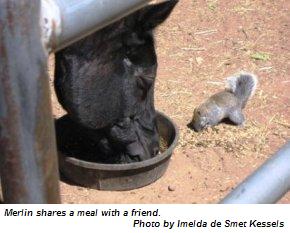 One powerful experience I’ve never shared publically involves an uncanny kindness Merlin showed me that first summer. He was an imposing and frightening sight back then, attacking anyone who tried to put a halter on him, often reacting as if he’d been shocked by a cattle prod when people reached out to touch him. Yet there was another, equally potent side to Merlin. He was the one who first showed me that fierceness and sensitivity can work together, must work together, if we are to heal the injustices of the past.
One powerful experience I’ve never shared publically involves an uncanny kindness Merlin showed me that first summer. He was an imposing and frightening sight back then, attacking anyone who tried to put a halter on him, often reacting as if he’d been shocked by a cattle prod when people reached out to touch him. Yet there was another, equally potent side to Merlin. He was the one who first showed me that fierceness and sensitivity can work together, must work together, if we are to heal the injustices of the past.
After my mother’s death, I was overtaken by a numbness I couldn’t shake, similar I supposed to the numbness returning soldiers feel. As one of her primary caretakers, one who’d held her hand as she endured incredible pain during those final hours, I’d somehow suspended my own grief and horror in order to best serve her needs and stabilize our extended family.
 A month after the funeral, I was doing some simple ground work with Merlin. A full moon was rising over the mountains, and the world, it seemed, was at peace. Suddenly, Merlin experienced an incredible surge of energy. Bucking and kicking out sideways, he caught me squarely in the lower abdomen. I let go of the lead rope, doubling over in pain. Yet even as the physical sensation subsided, the tears came pouring out of me, tears I hadn’t been able to cry the whole time my mother was dying. It was if he had flipped a switch in me. The stallion began to lick and chew profusely, equine signs of release. Slowly, gently, he walked over and touched my hand. Without a second thought, I put my arms around him and sobbed into his neck. Both of us, it seemed, needed to grieve the pain we had experienced and witnessed.
A month after the funeral, I was doing some simple ground work with Merlin. A full moon was rising over the mountains, and the world, it seemed, was at peace. Suddenly, Merlin experienced an incredible surge of energy. Bucking and kicking out sideways, he caught me squarely in the lower abdomen. I let go of the lead rope, doubling over in pain. Yet even as the physical sensation subsided, the tears came pouring out of me, tears I hadn’t been able to cry the whole time my mother was dying. It was if he had flipped a switch in me. The stallion began to lick and chew profusely, equine signs of release. Slowly, gently, he walked over and touched my hand. Without a second thought, I put my arms around him and sobbed into his neck. Both of us, it seemed, needed to grieve the pain we had experienced and witnessed.
Sunt lacrimae rerum. “Tears for passing things.” That’s how the Roman poet Virgil characterized the transformative power of grief over two thousand years ago. His most famous epic, The Aeneid, follows the adventures of the Trojan refugee Aeneas who leads a few ships of his fellow survivors to a new life in Italy after their city is destroyed. A furious storm knocks them off course, driving them to the shores of Libya.
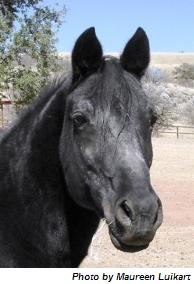 There the hero stumbles across an elegant shrine to the mother goddess Juno, where he’s amazed to discover a magnificent depiction of the Trojan Wars painted on the walls. Aeneas drops to the ground and weeps, touched by the fact that no matter who had won or lost, who had lived or died, these events were deemed important enough to memorialize in the embrace of a goddess, allowing the embittered warrior to cleanse his soul and witness his trials from a more exalted perspective.
There the hero stumbles across an elegant shrine to the mother goddess Juno, where he’s amazed to discover a magnificent depiction of the Trojan Wars painted on the walls. Aeneas drops to the ground and weeps, touched by the fact that no matter who had won or lost, who had lived or died, these events were deemed important enough to memorialize in the embrace of a goddess, allowing the embittered warrior to cleanse his soul and witness his trials from a more exalted perspective.
The bond Merlin and I felt was solidified the night we shed our own tears together. The next day I had a beautiful purple heart-shaped bruise in the center of my womb.
Midnight Merlin, you have proven over and over again to be a warrior, a sage and a magician in ways my limited human mind could never have imagined. Now you are a legend. May your story live on, touching our lives with magic wherever and whenever someone tells it.
Safe journey my teacher, my dear friend. You will not be forgotten.